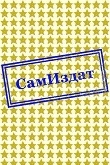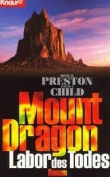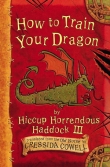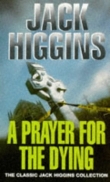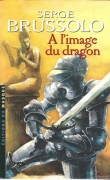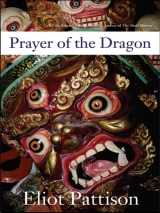
Текст книги "Prayer of the Dragon"
Автор книги: Eliot Pattison
Жанр:
Полицейские детективы
сообщить о нарушении
Текущая страница: 22 (всего у книги 24 страниц)
Hostene gazed toward the narrow stairs that had saved their lives. He had no way of knowing whether Abigail had been so lucky. He rose, then began walking toward the light at the end of the passage.
They clambered up trails fit only for goats. As the day faded, they made a fire of goat dung under a deep overhang, surrounded by rocks blackened by lightning strikes, beside the painting of a dragon god. “When we capture this crazed monk,” Gao asked as he stared at the vivid painting, “what will happen to him?”
“I don’t know,” Shan replied. “That depends on you.”
“You mean because of Thomas.”
“Because you are the only one among us who might report him to the authorities.”
“If I don’t, what then?”
“We take him back to Drango village, to save the life of Gendun.”
This was the impossible dilemma that had been gnawing at Shan since they had begun their strange pilgrimage. Gendun would never forgive Shan for saving his life by sacrificing that of the hermit, however deranged Rapaki might be.
“I don’t think it matters what I do,” Gao said. “Major Ren is involved now.”
The words quieted them. There were no pilgrims on this mountain, Shan realized. There were only fugitives. Their pasts had overtaken each of them, and their lives were changing. Every man there, including Shan, was beginning to glimpse the hollow shape of his future.
“Why did you do that?” Gao asked Hostene, and pointed to an object Hostene clutched between his hands. The Navajo had gleaned a splinter of wood from an old prayer flag stand and, with thread unwound from his shirt, had fastened some feathers to it.
“We’ve run out of mountain,” Hostene said. “In the morning there will be an end to it. It is time to call on the deities.” He had stripped off his shirt, wore only his vest, and had coated his bare arms with dust again.
Gao stirred the fire. “You have to understand,” he said in a patient voice, “I am a man of science.”
“And I used to be a judge,” Hostene replied earnestly. “But I learned something on this mountain. Here it isn’t about what we have put into our heads, it is about what we have put into our hearts.” He rose and took a new seat fifty feet away, where he had a better view of the sun setting over a hundred miles of horizon.
“Perhaps Heinz had to cross the border to fix his problems,” Shan offered a moment later. “You said the firm does a lot of business in India.”
Gao, his head cocked, was watching Hostene. “This is where you play the part of the clever detective trying to trick me into telling secrets. Didn’t you hear what Hostene just said?”
“I’ll tell you a secret, Doctor. Thomas may have presented many complex challenges but the reason he died was simple. He was trying to find the truth.” Shan explained Thomas’s fastidious work at the murder scene.
“There is a warehouse, in Bengal somewhere,” Gao finally said, “and that house on the ocean, in the south. Beautiful beaches. You saw the photo.”
“Who arranges the schedules and cargo of the trucks going south?”
“I don’t know. Heinz would know. He takes care of details. He’s probably in Tashtul now, taking care of Thomas’s body for me.”
“Only one more thing. Where did Heinz go, that year he was away?”
Gao did not reply. The fire died away. Soon Shan could see nothing but two dim eyes staring at the stars.
The end of the world came after midnight. There was no warning by wind or rain, only a massive bone-shaking clap of thunder that physically pushed Shan and his friends toward the back wall of the overhang, then a blinding explosion of light. They had come to the place where lightning was born. They had come to the home of the lightning god.
The bolts came one after another, with a deep rending force that seemed about to split not only the sky but the mountain as well. The air seemed to boil, churning in and out of their little cavity with the rhythm of the bolts, like the breath of some huge beast.
“Your eyes!” Shan shouted above the din, waving his hands. “Cover your eyes!” They looked at him in mute confusion, and he suddenly understood why. He was deaf, and, judging by their expressions, so were his friends. He crawled to each of them, pushing their forearms over their eyes, gesturing for them to face the wall, away from the flashes.
It seemed it would never stop. They could die so easily. One tongue of the lightning could leap into their confined space and leave them as bent, charred artifacts for some future pilgrim to consult as he passed by.
On it went, the explosions numbing not just his ears but his entire body, the light so intense that even facing the wall, the air smelling of metal, his arm over his eyes, Shan could sometimes see the crimson tinge of his flesh. He found himself slipping toward a place he had never been before, a destination perhaps intended by the path’s builders. He had no body left, no mystery left, no himleft. There were only explosions and light and shuddering air, and one question that would assure that when they found his remains there would be a look of wonder on his face-was this how it felt to be a deity?
Chapter Fourteen
His friends were all dead. When the storm finally stopped he crawled desolately from man to man, probing them, touching their backs as they lay curled against the wall. They did not move. Their flesh was so hard and cramped it seemed they had been baked alive.
Shan fell back against the wall, his heart and body ravaged, then eventually took stock of his own senses. He could see the stars and moon, could feel the wind on his face, but could hear nothing. His arms and legs ached, the hair on the back of his neck and arms was singed. His shirt was stiff and brittle at the cuffs.
He curled up on the ledge, facing outward this time, still so numb he couldn’t even feel despair, only think about how painful it would be when it came. He glanced back at his companions. Each man’s hands were balled up in fists, tucked under their chins. In corpses this was called the boxer’s posture, the effect of prolonged heat, which caused the muscles to contract. His eyes welled with moisture as he gazed out over the moonlit ranges.
Suddenly a foot kicked him. Someone was testing to see if hewere alive.
It was as if they had been frozen and were slowly thawing out. He could not see whose foot it was but he helped the struggling figure straighten his limbs, then dragged him into the moonlight. The man worked himself into a sitting position, trembling, squeezing Shan’s hand. It was Gao.
Shan sat with him, each man explaining with gestures to the other that he could not hear. Then he returned to the deeper shadows, leaving the scientist pondering the blackened edges of his clothing. He found the two remaining forms against the wall and felt each for a pulse. Hostene and Yangke were also coming back to life.
Half an hour later all four sat in the moonlight, Shan cradling Yangke’s head in his lap, Hostene holding one of the Tibetan’s hands. They were all deaf but Yangke was also blind.
No one argued when Shan took the lead in the morning, no one disputed their direction, still upward. After climbing for a while, Hostene leading Yangke by his hand, they reached a wide sheltered shelf that held not only small clumps of heather but also a few pools of water. They guided Yangke to a pool and after he had drunk his fill they sluiced it over his head and over his closed eyes, then let him roll onto sun-warmed moss and sleep. They washed themselves. Hostene found some small waxy blue berries that, though tart, provided a makeshift breakfast. They sat, still partially in shock, staring at each other, rubbing their ears, casting fearful glances toward the summit, within an hour’s reach now. If she had survived, Abigail could be up there, as deaf and blind as Yangke. But they were weary to the bone from the night’s ordeal. The warmth of the little hollow soon had them sprawled against the rocks, drifting into slumber.
A bird was calling in the distance when Shan awoke, perhaps two hours later. He saw it only ten feet away, languidly watched it eating some of the blue berries. Why did it sound so far away? Shan sat up as the welcome realization hit him. His hearing was returning. He turned to see Hostene bending over Yangke, whose face had turned yellow.
The Navajo had opened his precious sacred pollen from home. He had spread some on Yangke’s hands, and more on his cheeks and brow, and was bent over the Tibetan, speaking toward the crown of his head, waving his spirit feather in the air. The unintelligible words, which seemed to filter down a long pipe, made Shan worry again about his senses until he realized Hostene was speaking in his native tongue.
Shan stretched, stood, explored the beginning of the trail to the summit, then began picking more berries for Yangke, soon joined by Gao, who confirmed that his hearing was also beginning to return. When they brought the berries back, Yangke was sitting upright, cross-legged, moving his hand back and forth across his lap. “I see shadows,” he said in a hopeful tone. He could hear perfectly now, he explained, then ravenously consumed the berries they dropped into his palm.
Having passed through a corridor of natural stone covered with the most fearful paintings they had yet seen, they looked down on a quarter-mile-wide bowl directly beneath the summit. It seemed to be filled with debris, a jumble of jagged, lightning-scorched slabs that had sloughed off the pinnacle. In the center, at its lowest point, was an opening-not a crater but a jagged tear in the fabric of the peak, a crevasse perhaps a hundred feet long and thirty wide. All except the largest of the rock slabs had been cleared from around it. Its perimeter was outlined with tall cairns, some bearing the last threads of prayer flags from another century.
A wide pathway at one end of the fissure connected it to a shallow cave at the base of the summit, a twenty-foot-high indentation where a great piece of stone appeared to have been scooped out of the peak. Halfway between the cavern and the fissure were two figures, one in an oft-patched red robe who was prostrating himself as he advanced toward the hole. The other, wearing a long green vest with many golden bracelets and a tiered headdress, trudged behind him.
Hostene ran forward.
“No!” Shan shouted in vain. They had lost the benefit of surprise, lost all chance of comprehension before confronting those below. Gao hurried past, holding one of Yangke’s hands. The scientist was supposed to be leading the blind Tibetan but Gao appeared to be dragged by Yangke.
Shan lingered, trying to see the place as Lokesh might, as the builders had intended. They had experienced the end of the world the night before, and now had reached the home of the deities. For one who believed the supreme deities were lightning gods, such a place would be the gateway to heaven, and the proper final home for a wandering Tara. He studied the fissure, the prostrating monk, the strangely submissive Navajo woman, then ran to Gao’s side.
“Don’t,” he said, surprised to find himself panting for breath, reminding himself of the thinness of the air.
“Don’t what?” Gao asked.
“I don’t know,” Shan said, a terrible premonition building inside him. “Don’t believe anything is as it seems.”
“Tell him,” Gao said, pointing to Hostene, who walked beside his niece now, trying to get her attention.
Abigail Natay appeared to have aged ten years. Her skin was chalky, her eyes hollow, her hair dull and tangled under the old headdress of the Tara costume. She had been sprinkled with pollen. On one hand was a daub of white paint, tapered at the ends. She had acquired a third eye. Hostene seemed to be unable to touch his niece. As Shan halted a dozen feet away the Navajo extended his hand to within a few inches of her, withdrew it, then repeated the motion. She gave no sign of seeing him, staring straight ahead at the bobbing head of the pilgrim she followed.
Rapaki, moving at the snail’s pace of the prostrating pilgrim, seemed to be heading for a stone altar at the rim of the fissure, beside a long heavy slab that had fallen so it extended perhaps eight feet over the hole.
Shan turned to see Gao guiding Yangke to a ring of flat stones arranged like seats in front of the cavern. As he watched, Gao paused, his expression rigid as he looked at something on the floor of the cave. Shan took a step closer, and another, trying to see, then broke into a run. The leg of a man sprawled from behind a rock in the cave.
He sped past Gao. A moment later he reached the prostrate form, which was bound with rope.
“How could-,” Gao began as he saw the color of the man’s hair. “What have they done?” he groaned.
Shan pulled the man onto his back. It was Heinz Kohler.
The German’s temple was bleeding from a jagged cut. His arms were tied against his sides with yak-hair rope that had been wound around his body a dozen times. Gao bent over his unconscious friend, examining one arm, then the other. Satisfied that Kohler’s hands were intact, he began untying him. Leaning against the rock beside him was a short ceremonial ax, its four-inch blade stained brown. Shan lifted the blade. It matched the outline he had seen on the wall of the storage chamber at the hermit’s cave. At the center of the blade the metal was nicked.
They laid Kohler in the sunlight, Shan cupping rainwater from another of the natural bowls in the rock and splashing it over the German’s face as Gao hovered over him, wiping the blood from Kohler’s check with his handkerchief. The German’s eyes fluttered open and he gazed at Gao for a long moment before recognizing him. “They tied me up,” he explained in a weak voice. “Rapaki. He’s insane. He has her under some kind of spell.” Then his eyes came into focus and he sat up. “Abigail!” Kohler shouted, then he staggered to his feet and ran toward her.
He did not hesitate to touch her but grabbed her and thrust her toward Hostene, then ran toward Rapaki.
The hermit was nearly at the edge of the fissure now, before the little altar. Shan reached him first but hesitated.
“Anything from your old lamas about disturbing a lunatic killer who is pretending to be a pilgrim?” Kohler asked in a bitter voice.
For the first time, Shan saw that Rapaki carried a leather bag, a pilgrim’s bag, strapped to his belt.
“Rapaki,” Shan called softly. The hermit did not react.
Abigail was moving again, in tandem with Rapaki, as if bound to him by some invisible cord. Kohler, blood still trickling down his face, cast an impatient glance at Hostene, then charged toward Abigail, scooping her up onto his shoulder and carrying her back to the cavern.
The mantra Rapaki chanted grew louder, and oddly joyful.
“I don’t understand,” Hostene said. He had taken several steps toward his niece, now seemingly out of harm’s way, then paused, his troubled gaze on the hermit.
“He has an offering to make,” Shan said, gesturing toward the altar.
“To what?”
“To all the gods and saints who live below.”
“Below?”
“He’s been looking for it all his life. Abigail showed him the way. The bayal, the home of the gods.”
They looked back. Gao was with Kohler now, wiping Abigail’s face as the German covered her with a blanket.
“What are you waiting for?” Hostene called out. “He is the killer!”
“Let him finish,” Shan said. “After he’s come all this way, after all these years, let him touch the altar and make his offering.”
“He has to be brought to justice,” Hostene said. “We must take him back to the village. You have to think of Gendun and Lokesh.”
That, Shan did not say, is exactly what I am doing.
Shan advanced toward the altar, and lowered himself to the ground. Rapaki touched the altar, his face radiant, then stood and bowed his head. His pilgrim’s bag was heavy, with several bulky objects inside. From inside his robe he produced a small cloth pouch from which he extracted several ceremonial offerings, laying each on the stone altar. He absently glanced at Shan, went back to his work of stripping things from his belt, then paused and looked at Shan. He extended a single finger and pressed it against Shan’s chest, glanced at Abigail, now at the cave, then gazed uncertainly at Shan again.
Shan brought Lokesh’s old amulet box out of his shirt. Rapaki reacted with a smile, touching the box, nodding now as if he knew this much was real. He then stripped off his tattered shoes and robe, so that he wore nothing but a swath of cloth around his loins, a string of beads on his wrist, and a small silver gau around his neck. The hermit squatted for a moment, writing in the dirt below the altar, beginning the mantra for the Compassionate Buddha. He paused, touched Lokesh’s gau again, then resumed writing with his other hand. Rapaki had never gone to formal schools. He had taught himself to write with either hand. He was both right-handed, and left-handed.
“What is he doing?” Shan saw that Hostene had gone to Abigail’s side and been replaced by Gao.
Rapaki folded his tattered robe carefully. Advancing halfway down the slab that extended over the fissure, he dropped it into the hole. The robe fell only a little way down, then was lifted in an updraft, floating in the air fifteen feet, then twenty feet above them, rising, unfolding, appearing like a phantom monk hovering above them.
“The rope,” Shan said quietly to Gao. “Perhaps he could be tied.” The scientist offered a hesitant nod, looking uneasily at the still-hovering robe, and jogged toward the cavern.
As Gao retreated, Rapaki produced a scrap of folded leather from his waistband, unfolded it, and poured its contents into his hand. Pollen. The hermit was sprinkling pollen on his head. Shan reached into his pocket and lifted the little piece of gold he had found below, extending it on his palm. Rapaki saw it, glanced back and forth from the fissure to Shan, then stepped forward and with a small nod accepted the gold from Shan.
“Lha gyal lo,” Shan whispered. He raised his left hand to a forty-five-degree angle, his palm downward, his forefinger down, tucked under his thumb.
Rapaki looked more serene than Shan had ever seen him. “Lha gyal lo,” the hermit repeated in a scratchy voice as he studied Shan’s hand and nodded again. He dropped Shan’s gold into the pilgrim’s bag, then stepped to the end of the slab. As he did so, the wind ebbed and the robe slowly floated down. Rapaki held out the bag at arm’s length, speaking words Shan could not hear, and dropped it into the fissure.
Shan saw no actual movement by the hermit. It was as if the wind simply reached out for him. One moment he was on the slab, watching his bag drop, the next he was in the void, following it, passing his robe as it fluttered downward. His mantra seemed to grow louder as he fell. Shan could still hear it after he dropped from sight, leaving only his robe, empty, floating gently into the shadows.
He did not know how long he stared into the fissure. When he turned, Gao and Hostene were at the altar, anger on their faces, as if Shan had cheated them of something.
“What was that you did with your hand?” Gao asked.
“It was nothing,” Shan said. But it was something. Shan had finally understood everything, and the only thing he could offer was the abhayamudra, the hand gesture known as Bestowing Refuge.
“He had a bag,” Hostene said. “Why did he take that old bag?”
Shan looked at the Navajo. He could see in his eyes that Hostene understood but needed to hear it said aloud. “His offering. The deity he prayed to seemed to favor necklaces of body parts.”
“The hands,” Gao murmured.
“I tried to stop him, tried to get the evidence,” a new voice said from behind them-Kohler. “But he hit me and tied me up.”
Shan studied the items Rapaki had left on the altar. An agate dzibead, a traditional good-luck charm. A small silver incense case. And, still in the cloth pouch, something hard and lumpy that Shan recognized from its feel. He handed the pouch to Hostene.
“The beetle!” Hostene exclaimed. It was Abigail’s golden beetle.
Hostene followed as Shan moved to the end of the slab where the hermit had jumped. The Navajo pointed to a small ledge fifty feet below, then another deeper, and another to the side. The first held a rag, a piece of clothing caught in a crack in the rock. The other two held small yellow rocks.
“It’s where the gold went, isn’t it?” Hostene said, “the missing gold. All these centuries, they just brought it up to the bayal.”
Shan nodded as Gao and Kohler approached. “It’s the best use of gold, the old Tibetans always thought. To praise the deities.”
Hostene offered a sad, reverent nod. “It’s over. He’ll kill no more.”
“Not in this world,” Kohler said. Then, remembering Abigail, he turned and jogged back to the cavern.
Gao watched the German for a moment. “Heinz returned yesterday,” he explained to Shan. “He had the helicopter leave him here when he discovered I had been dropped near the summit. He was already here when Rapaki arrived with Abigail, and quickly understood what had happened.” The physicist studied the altar a moment, then gazed into the blackness below. “How does it happen? How does a holy man become deranged?”
“Perhaps the real miracle of modern Tibet,” Shan replied, “is that they are not all like that.”
They were reluctant to move Abigail immediately, and decided to make camp inside the shallow cavern. There was no wood for a fire but the goat trails around the summit were littered with dried dung. Kohler and Hostene set off to gather fuel in a bandanna as Yangke sat with Abigail, a makeshift blindfold over his eyes, his hand cradling Abigail’s as she slept. Probing the back of the cavern, Shan gleaned from the shadows a small iron bowl and two cracked ceramic jars with dried grease inside, butter lamps abandoned long ago.
Soon they had a bowl filled with rainwater simmering with leaf tips. As the tea brewed, Hostene investigated the contents of his niece’s pack. There were four feathered spirit sticks, two little ketaan figures, even some flower heads stuffed into a plastic bag for their pollen. Hostene held up her journal, pointing out several new pages of writing, describing newly discovered shrines but nothing more, nothing about their ascent of the summit, nothing from the days since Thomas had been killed. But then her uncle pointed to where the writing stopped. A dozen pages had been torn out of her precious book.
As she drank her tea, Abigail stirred from her trance slowly, finally holding the warm bowl in both hands herself, rocking back and forth in front of the little fire, staring into her tea. Hostene sat beside her, watching with worried eyes.
“Lha gyal lo,” she said, looking only at Shan, then leaned against her uncle’s shoulder, looking now like a tired and frightened schoolgirl.
“It’s altitude sickness,” Kohler explained. “I’ve seen it many times. The symptoms vary. Sometimes, when the brain swells, the victim loses all sense of reality. He or she might be capable of anything, I guess.” He turned to Gao. “I will go to bring back help.”
“No, Heinz,” Gao said. He had hardly taken his gaze from the chasm since Rapaki had flung himself into it. “We are a blind man, an injured woman, and two old men. We need you and Shan with us for the descent. Only two of the staffs are left. We’ll need them both for the final climb down that chain.”
“Old? You and Hostene? Men of iron don’t get old, even if they corrode around the edges.”
Gao was not interested in glib rejoinders. “We need rest. As you have reminded us, the altitude alone can kill if we are not careful. As for the monk who died, I can’t help but wonder if words should be said.”
“Words?” Kohler shot back. “For a bloodthirsty killer? What do you think he had in that damned bag? He wasn’t taking sweets to his heathen gods. Whatever Thomas was missing was-” The sentence faded as the German saw Gao’s brittle expression. “OK,” he said. “Right. I’ll stay.”
“You don’t understand Rapaki,” came a low, dry voice. It was Yangke, blindfolded, speaking. “He tried hard at first to understand what being a monk meant, but he had no teachers. It is as if he had been asleep for years, fighting through nightmares, and this was the day he finally woke up.”
No one replied. A single tear rolled down Abigail’s cheek. She did not speak, did not offer any explanation, did not look up from her tea again. Hostene hovered near her, his face dark with worry and foreboding.
In the afternoon they tried to sleep. Shan, knowing he would never find slumber, helped Yangke to Hostene’s side, and left the camp with the bandanna to gather more fuel. They weren’t going anywhere that day and it would be a long cold night. He probed each goat trail, many of which petered out into tiny ledges, inches wide, along rock faces impassable for humans. He climbed toward the summit, noting for the first time a small shelf that overlooked both the east and west slopes. Something on it flashed in the sunlight, and he ducked for cover for a moment before warily advancing. He was perhaps two hundred feet away when he recognized it for what it was, and shrank back. Two small shiny solar panels were attached to a metal box with two six-foot poles rising out of it, all camoflauged with gray paint to blend with the rocks. He had stumbled upon a radio relay station for the army base below.
Half an hour later, the bandanna full and tied shut, he found another ledge with an open view to the south and east. He stepped to the edge, resisting the temptation to sit with crossed legs for an hour and let the wind scour him. But he did not dare leave the camp for so long. The army’s secret installation below was in plain sight, no more than two miles away. Above the base was a huge steeply slanting wall of rock, with a strange pattern of pockmarks. He knelt, shielding his eyes, as he studied it. Not pockmarks. Steps had been constructed along ancient goat paths, and the army had used howitzers to destroy them. The devout had not all died at the top. For centuries they had had a way to descend after visiting the mountain god into the lush, fertile valley below, which would have seemed like a paradise to a pilgrim who had navigated the old Bon kora. For a brief moment he was buoyed with the hope that there still might be a safe way down. But no, the army had shown its usual thoroughness. Great slabs had been blown away by artillery shells in a dozen places. Not even a goat could make it down.
“I can see why the gods decided to live here.” The smooth, confident voice came from directly behind Shan.
Shan let the cloth slide through his fingers, catching it by the loose gathered ends. A red flowered bandanna loaded with dung, the perfect weapon for the battle he had been drawn into. He did not face Kohler, but turned sideways, to maximize the force of his swing. “The lost gold, Heinz,” he said in a conversational tone, “it all went down that hole long ago.”
“Lost gold?”
“The gold Bing died trying to find.”
“Bing? Was he one of those miners?”
“We called Lhasa, looking for you.” He raised the bag of dung from his side. “Your old friend moved away over a year ago. That woman in your apartment, the one who has the hotel calls routed to her, does she go to India too?”
“You must be giddy, Shan. I warned you about the altitude.”
Kohler advanced in small steps toward Shan. Behind Shan, inches away, was a five-hundred-foot drop. Shan pulled out the slip of paper with the private number he had obtained through Lhadrung. Kohler, perplexed for the moment, took it.
“Gao knows you lied, though he won’t admit it yet. He knows if he called that number right now she would give him the same message. It’s only a little lie, but with a man like Gao, once doubt begins it can’t be stopped.”
Shan dashed past him. Kohler grinned, opened his hand, and let the wind seize the paper on his open palm. “Gao knows I have business in India. Gao knows I have girlfriends.”
“You dispatch trucks from Tashtul to India. It would take a special driver, and special papers. There would be fees to pay, bribes even. Customs officials are notorious. A lot of trouble for some little trinkets.”
“It’s the new world order. Converting Western appetites into Eastern cash.”
Kohler did not follow when Shan started down the trail. After ten steps Shan looked back. The German was astride one of the high boulders, looking toward the smudge of color on the southern horizon, the distant Himalayas, the white sands of India beyond.
In Shan’s absence Hostene had used the spirit feathers, placing them in a semicircle against the rock to encircle the place where he sat with Abigail. Abigail had begun a transformation back to the woman Shan had first met at Gao’s storehouse, washing away her third eye, removing the jewelry and ceremonial vestment that had covered her denims. Gao was sleeping. Yangke, his blindfold bandage still in place, was working his beads with a low murmur.
Kohler said nothing when he returned. He helped with the camp work, then sat on a rock beside Gao when the older scientist awoke, speaking of the weather, their company business, of arrangements for Thomas’s burial, of suggestions for the boy’s funeral service. He had made a bowl of tea for the older man, offering some of his spare clothes to cushion Gao’s seat on the rocks.
“Heinz, look!” Gao suddenly exclaimed with ridiculous hope in his voice as he pointed upward. “It’s Albert and his father! The young one is flying!”
The announcement seemed to jar Kohler. He paused, then raised a hand, squinting, pointing like an eager boy as the two birds disappeared toward the western slope. “It would take days for us, but they can get home in five minutes,” he said. He exchanged an awkward smile with Gao. But something seemed to have broken inside him.
Their strange, otherworldly day was coming to a close. They were finishing their domestic chores, stacking fuel for the night fire, arranging what blankets they had around Abigail and Yangke, when Shan saw a solitary figure pacing around the fissure. He caught up with Gao, and walked with him silently for several minutes.

